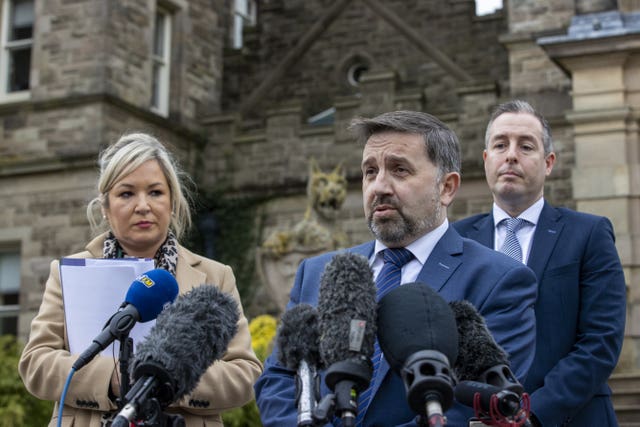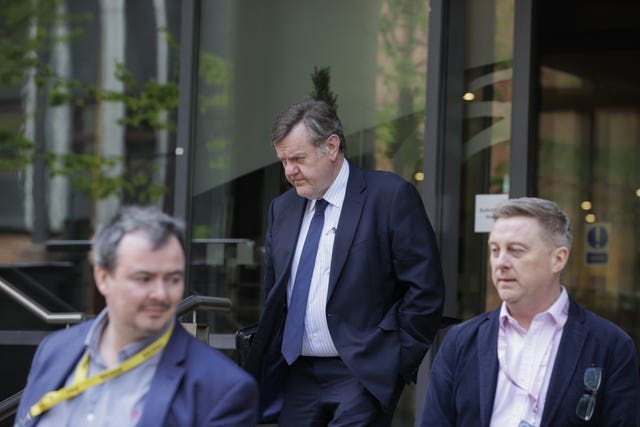Beattie blasts inquiry revelation that official suggested Swann be ‘reshuffled’
Evidence to the UK Covid-19 Inquiry suggests a senior civil servant made the suggestion after other ministers expressed frustration.

Ulster Unionist Party leader Doug Beattie has described revelations that it was suggested Health Minister Robin Swann be reshuffled at the outset of the coronavirus pandemic as “extraordinary and bizarre”.
Evidence to the UK Covid-19 Inquiry has suggested a senior civil servant made the suggestion after frustrations were voiced within the Stormont Executive.
The move was mooted after then deputy first minister Michelle O’Neill, and to a lesser extent then first minister Arlene Foster, expressed frustration with the Department of Health, evidence to the UK Covid-19 Inquiry has suggested.
In a tranche of evidence documents published by the inquiry on its website on Wednesday evening, an email exchange between civil servants in March 2020, then head of the Northern Ireland Civil Service Sir David Sterling noted Ms O’Neill’s frustration at “having little power or influence over the health service”.

A senior official in the Department of Finance at the time, Hugh Widdis, suggested a “ministerial reshuffle” with a view to a health minister from Sinn Fein or the DUP, the two largest parties in Northern Ireland, which Ms O’Neill and Ms Foster respectively belonged to.
“There would be more radical options but I presume that they aren’t palatable eg: asking Robin to take a different portfolio for the duration (they would have to make a tempting offer) and putting a SF or DUP Minister in? Or causing d’Hondt to be run again,” he wrote in the email exchange.
There were also other suggestions such as developing an emergency programme for government, or creating “an all-Exec overarching Covid strategy” which the first and deputy first ministers “can lead and own”.
Mr Swann remained in place as health minister throughout the pandemic, and in January 2024 resumed the role following the re establishment of devolved government.
He said he is writing to the current head of the Civil Service, Jayne Brady.
“Some of the commentary seems to suggest that a deliberate attempt to isolate and bully the health minister was taking shape,” he said.
“The suggestion is that the then deputy first minister – Michelle O’Neill – wanted the two big parties, the DUP and Sinn Fein, to take control of the situation.
“At the same time, some of their ministers refused to bring forward Covid regulations before the Assembly because it would be unpopular and, in some cases, refused to support necessary but unpopular regulations.
“I will be writing to the head of the Civil Service – Jayne Brady – to discuss the revelation that one of her senior civil servants floated the idea that the health minister should be replaced by a minister from one of the two big parties.
“The Civil Service should be non-party political, yet this idea clearly showed that this individual was more concerned about placating Sinn Fein and the DUP duopoly.”
Inquiry hearings continued on Thursday with evidence from former interim head of the civil service Jenny Pyper, Dr Joanne McClean from the Public Health Agency, and Chris Stewart, the then head of civil contingencies at the Executive Office.

The inquiry heard the branch could activate the Civil Contingencies Hub in the event of incidents such as extreme weather events or pandemics.
Mr Stewart said in “business as usual mode” the branch was focused on policy, but the role changes “quite significantly” when it goes into operational mode, and becomes the core of the staff of the hub.
“It was developed on the back of Brexit, but it was designed to be contingency blind, to be sufficiently flexible to be deployed for any type of contingency that might arise,” he said.
The inquiry heard there were five members of staff in the branch in February 2020, with an aim for 12 staff, but by February 6 it had gone down to two staff.
He said after “extremely hard work”, by March 9 the hub produced initial sectoral resilience plans.
“As a result of that extremely busy period that the branch had had, I think the phrase I used, was that they were on their knees,” Mr Stewart told the inquiry.
Mr Stewart said he also agreed with evidence given by Sir David to the inquiry on Wednesday, that they ought to have been better prepared.
The UK-wide inquiry opened hearings in the Northern Ireland capital on Tuesday morning.
The hearings in Belfast will run for three weeks and are designed to provide an opportunity to look in depth at the decisions taken in Northern Ireland.
This module will investigate the initial response, central government decision-making, political and Civil Service performance as well as the effectiveness of relationships with governments in the devolved administrations and local and voluntary sectors.
It will also assess decisions behind lockdowns and other non-pharmaceutical interventions.





